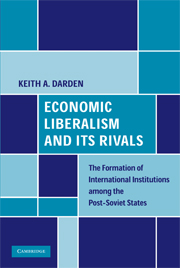Crossref Citations
This Book has been
cited by the following publications. This list is generated based on data provided by Crossref.
SAUNDERS, ELIZABETH N.
2006.
Setting Boundaries: Can International Society Exclude "Rogue States"?1.
International Studies Review,
Vol. 8,
Issue. 1,
p.
23.
2011.
Migration, Refugee Policy, and State Building in Postcommunist Europe.
p.
19.
Arakelyan, Lilia A.
and
Kanet, Roger E.
2012.
Russia and its Near Neighbours.
p.
265.
Bennich-Björkman, Li
and
Likić-Brborić, Branka
2012.
Successful But Different: Deliberative Identity and the Consensus-Driven Transition to Capitalism in Estonia and Slovenia.
Journal of Baltic Studies,
Vol. 43,
Issue. 1,
p.
47.
Bennich-Björkman, Li
and
Johansson, Karl Magnus
2012.
Explaining moderation in nationalism: Divergent trajectories of national conservative parties in Estonia and Latvia.
Comparative European Politics,
Vol. 10,
Issue. 5,
p.
585.
van der Vleuten, Anna
and
Alons, Gerry
2012.
La Grande Nationand Agriculture: The Power of French Farmers Demystified.
West European Politics,
Vol. 35,
Issue. 2,
p.
266.
PEPINSKY, THOMAS B.
2012.
Do Currency Crises Cause Capital Account Liberalization?1.
International Studies Quarterly,
Vol. 56,
Issue. 3,
p.
544.
Elliott, David L.
2012.
The Wiley‐Blackwell Encyclopedia of Globalization.
Chandler, Andrea
2013.
Democracy, Gender, and Social Policy in Russia.
p.
169.
Libman, Alexander
and
Obydenkova, Anastassia
2013.
Informal governance and participation in non-democratic international organizations.
The Review of International Organizations,
Vol. 8,
Issue. 2,
p.
221.
Abdelal, Rawi
2013.
The profits of power: Commerce andrealpolitikin Eurasia.
Review of International Political Economy,
Vol. 20,
Issue. 3,
p.
421.
2014.
Globalizing Oil.
p.
1.
Colgan, Jeff D.
2014.
The Emperor Has No Clothes: The Limits of OPEC in the Global Oil Market.
International Organization,
Vol. 68,
Issue. 3,
p.
599.
Alons, Gerry
2014.
Farmers versus ideas: explaining the continuity in French agricultural trade policy during the GATT Uruguay Round.
Journal of European Public Policy,
Vol. 21,
Issue. 2,
p.
286.
Hamilton, John
and
Deakin, Simon
2015.
Russia’s Legal Transitions: Marxist Theory, Neoclassical Economics and the Rule of Law.
Hague Journal on the Rule of Law,
Vol. 7,
Issue. 2,
p.
283.
Deakin, Simon
and
Hamilton, John
2015.
Russia's Legal Transitions: Marxist Theory, Neoclassical Economics and the Rule of Law.
SSRN Electronic Journal,
Lane, David
2015.
The Eurasian Project and Europe.
p.
3.
Markowitz, Lawrence P.
2016.
Rural economies and leadership change in Central Asia.
Central Asian Survey,
Vol. 35,
Issue. 4,
p.
514.
Köstem, Seçkin
2016.
When Can Idea Entrepreneurs Influence Foreign Policy? Explaining the Rise of the “Turkic World” in Turkish Foreign Policy.
Foreign Policy Analysis,
p.
orw016.
Vinokurov, Evgeny
and
Libman, Alexander
2016.
The EDB System of Indicators of Eurasian Integration: Trends and Dynamics of the Eurasian Economic Integration in 199992012.
SSRN Electronic Journal,





